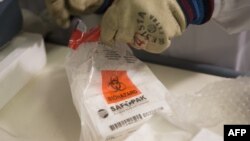The World Health Organization has established criteria for conducting clinical trials on experimental drugs and other therapies for the treatment of Ebola. Members of WHO’s Scientific and Technical Advisory Committee on Ebola Experimental Interventions say great care must be taken to ensure the safety of a product before any testing is done on humans to evaluate its efficacy.
Everyone is looking for a cure for Ebola but, there is nothing yet on the horizon. However, the scientific community has proposed interventions, including vaccines, convalescent blood and plasma, and medicines in its search for answers.
WHO’s Advisory Committee notes none of these interventions have yet been evaluated for efficacy against Ebola Virus Disease. Therefore, it says clinical studies to assess their safety and efficacy are required.
Martin Friede, a Scientist in Public Health, Innovation, and Intellectual Property at WHO, says it is difficult to know whether people who contracted Ebola in West Africa and were sent home to the United States and countries in Europe recovered because of the drugs they were given or because they received a high standard of care.
Standardized care
Because of this uncertainty, he says the committee agrees that novel drugs must be tested in a situation where this care is standardized.
“If there is variation in the care that the patients are receiving, it is going to be very difficult to determine whether survival or lack of survival is either due to the drug being efficacious, the drug being toxic or to variations in the standard of care that the patients are receiving,” said Friede.
Unfortunately, Dr. Friede says there are only a handful of centers in Ebola-infected countries where the standard of care is good and consistent enough for clinical trials to occur. He says there are more drugs and interventions to test than there are facilities to test them.
“We at WHO have received somewhere in excess of 120 propositions of products and people saying we would like to test these products. And, we have possibly between six and eight clinical trials where such products could be tested," he added. "So, there is, therefore, a need for us to prioritize which products are actually going to go into these clinical trials. Otherwise, it is going to be complete chaos.”
Uniform data collection
The committee hit another roadblock in settling upon a uniform method of data collection during the clinical trials. Currently, Dr. Friede notes, everybody is evaluating drugs using different sets of data collection.
“We will not in the end be able to compare and contrast results and we could finish up with having lots of trials done and no useable data because all of the trials were too small. So we learned about a data collection form, which has been harmonized, which will be used by several groups," explained Friede. "And, this is going to facilitate data collection and sharing data across multiple trial sites.”
Dr. Friede says the committee has been informed that clinical trials of convalescent whole blood and plasma are ready to start in two affected countries: Guinea and Sierra Leone. He says they are in the planning stages.
He says patients have to be tested because there is little evidence that blood and blood-derived products are efficacious in the treatment of Ebola. Dr. Friede says it is essential to get good quality and safe blood from Ebola survivors, therefore, the blood must be drawn in a controlled manner to make sure no diseases are transmitted.




